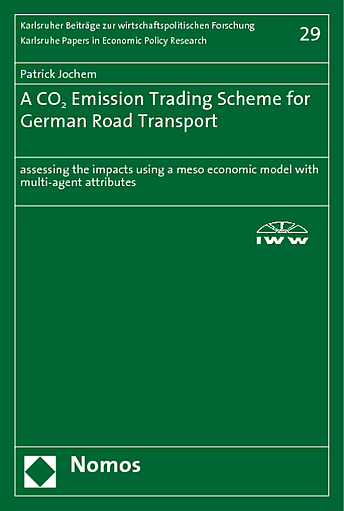englischTo attempt to counter the possible impacts of global warming, the European Union promised to reduce its carbon dioxide (CO2) emissions by 8 % until 2010 compared to 1990. So far, the transport sector, which contributes to around 28 % of European CO2 emissions, has been exempted from the European Emission Trading Scheme (ETS), although it is the only sector which increases its CO2 emissions.
The author develops a partial meso-economic simulation model with multi agent attributes to assess the impacts of an upstream CO2 emission trading scheme in German road transport. The effects on certificate prices and fuel demand are calculated with respect to the individual reaction functions of households and freight forwarders. It becomes apparent that from the current perspective the willingness-to-pay of households for prestigious (but fuel-inefficient) cars is outbalanced by technical mitigation costs in other sectors. Thus, in the open trading scheme (extended ETS) no major changes in transport demand are assumed. The main effect will be steady CO2 emissions in road transport but high payments to other sectors for mitigation. Macroeconomic impacts complete the analysis.
Der Deutsche Verkehrssektor emittiert knapp 160 Mio. t CO2 pro Jahr (d.h. 18% der gesamtwirtschaftlichen Emissionen) und trägt bisher am geringsten zum Erreichen der Emissionsminderungsziele bei. Um die Anreize zur Emissionsminderung beim Hauptverursacher im Verkehrssektor, dem Straßenverkehr (90%), zu erhöhen, diskutiert die Europäische Kommission seit Längerem über eine mögliche Einführung eines Zertifikatehandels.
Um die hierdurch induzierten Auswirkungen eines Up-Stream-CO2-Zertifikatehandels im Deutschen Straßenverkehr auf Haushalte und Speditionen abzuschätzen, entwickelte der Autor ein empirisch kalibriertes agentenbasiertes meso-ökonomisches Simulationsmodell.
Dieses ermöglicht die Zusammenhänge des Emissionsziels, Kraftstoffnachfrage, Zertifikatepreise in intra- oder intersektoralen Zertifikatehandelssystemen zu simulieren. Der Autor empfiehlt ein intersektorales Handelssystem, da die Zahlungsbereitschaft für individuelle Mobilität größer ist, als Vermeidungskosten in andere Sektoren. Der Verkehrsteilnehmer würde somit CO2-Minderung in anderen Sektoren durch einen erhöhten Kraftstoffpreis bezahlen. Neben den mikro- werden auch makroökonomische Ergebnisse berücksichtigt.


